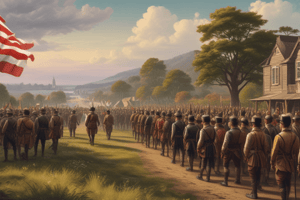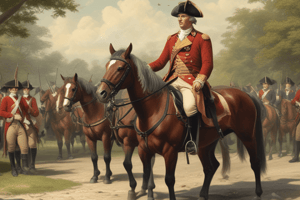Podcast
Questions and Answers
Why did British leaders think it was fair for colonists to pay for the expenses of conflicts?
Why did British leaders think it was fair for colonists to pay for the expenses of conflicts?
- Because colonists had been making their own laws
- Because the British Empire was facing a financial crisis
- Because Britain had been defending the colonies from other nations and Native Americans (correct)
- Because colonists were part of the British Empire
What was the purpose of the Declaratory Act?
What was the purpose of the Declaratory Act?
- To establish greater British control over the colonies
- To make sure colonists realized Britain was in charge, not local governments (correct)
- To punish the colony of New York for not obeying British orders
- To raise money for the British government
What was the main reason for the Townshend Acts?
What was the main reason for the Townshend Acts?
- To make sure colonists paid for the expenses of conflicts
- To punish the colony of New York for not obeying British orders
- To establish greater British control over the colonies and raise money (correct)
- To raise money for the British government
What did the import duties imposed by the Townshend Acts include?
What did the import duties imposed by the Townshend Acts include?
What was the third measure of the Townshend Acts?
What was the third measure of the Townshend Acts?
What was the main reason why the colonists viewed the Townshend Acts as an abuse of power?
What was the main reason why the colonists viewed the Townshend Acts as an abuse of power?
What was the consequence of the Townshend Acts on the imports of goods into the colonies?
What was the consequence of the Townshend Acts on the imports of goods into the colonies?
What was the significance of the governors being paid by Britain after the Townshend Acts?
What was the significance of the governors being paid by Britain after the Townshend Acts?
What was the outcome of the colonists' resistance to the Townshend Acts?
What was the outcome of the colonists' resistance to the Townshend Acts?
What was the underlying issue that contributed to the colonists' resistance to the Townshend Acts?
What was the underlying issue that contributed to the colonists' resistance to the Townshend Acts?
Flashcards are hidden until you start studying
Study Notes
Britain's Financial Troubles
- Britain fought to maintain control of its empire, leading to significant expenses.
- The British government thought it was fair for American colonists to pay for the costs of defending them from other nations and Native Americans.
Colonial Resistance to Taxes
- British Parliament passed laws (Acts) to establish additional taxes on colonists, but they disagreed.
- Taxes were previously decided by colonial legislatures, and they opposed British interference.
- Acts included the Stamp Act, Sugar Act, Currency Act, and Declaratory Act.
The Townshend Acts
- In 1767, British politician Charles Townshend proposed the Townshend Acts to establish greater British control over the colonies and raise money.
- The Acts included:
- Punishing New York colony for not paying for British soldiers' housing.
- Imposing import duties (taxes) on everyday products like glass, lead, paper, paint, and tea.
- Creating a new government agency to ensure colonists paid taxes, with revenue going to Britain.
Taxation Without Representation
- Colonists had no representative in Parliament to express their opinions or vote on their behalf.
- Patriots like Samuel Adams argued that Parliament couldn't impose taxes without their consent, citing existing agreements allowing colonies to self-govern.
Rebellion and Response
- Colonists responded to the Townshend Acts with protests, violence, and boycotts.
- Imports from Britain were reduced by half in the year following the Acts.
- On March 5, 1770, Parliament repealed all import duties except the one on tea, calming tensions temporarily.
- Ideas about revolution were already growing, leading to further conflict.
Studying That Suits You
Use AI to generate personalized quizzes and flashcards to suit your learning preferences.




